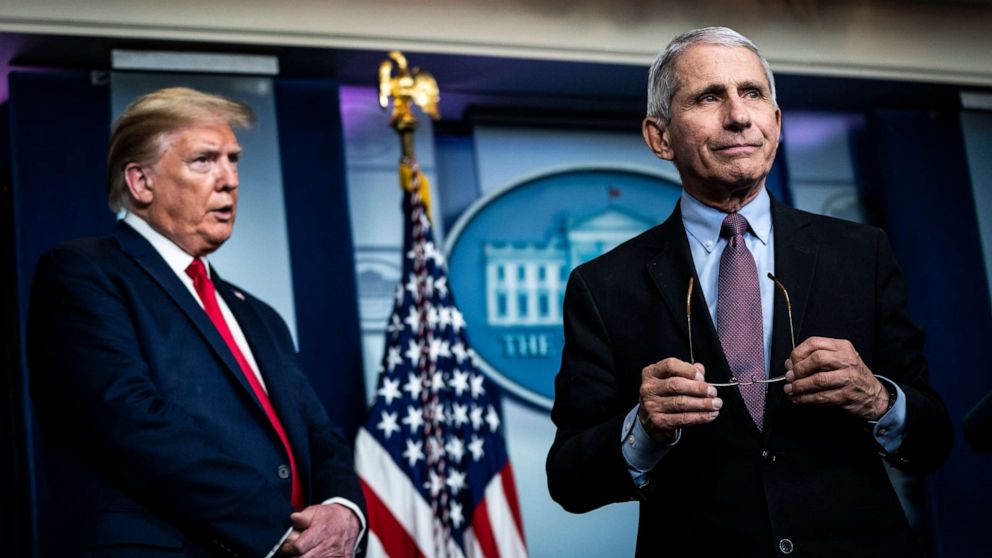Tracking Trump and Fauci's tense relationship
As the White House tried to discredit the nation's top expert on infectious diseases Dr. Anthony Fauci, with President Donald Trump saying he's a "nice man" but "made a lot of mistakes," Fauci continued to break from the administration's rosy messaging on the coronavirus, warning Monday the pandemic is "unprecedented" and the worst is yet to come.
The White House's attempt to marginalize Fauci and limit his press appearances comes after months of Trump downplaying the virus -- even going so far in February to claim that "one day -- it's like a miracle -- it will disappear" -- Fauci has emphasized "the virus dictates the timeline."
Here's a timeline of notable moments in Trump and Fauci's different takes as the pandemic has progressed:
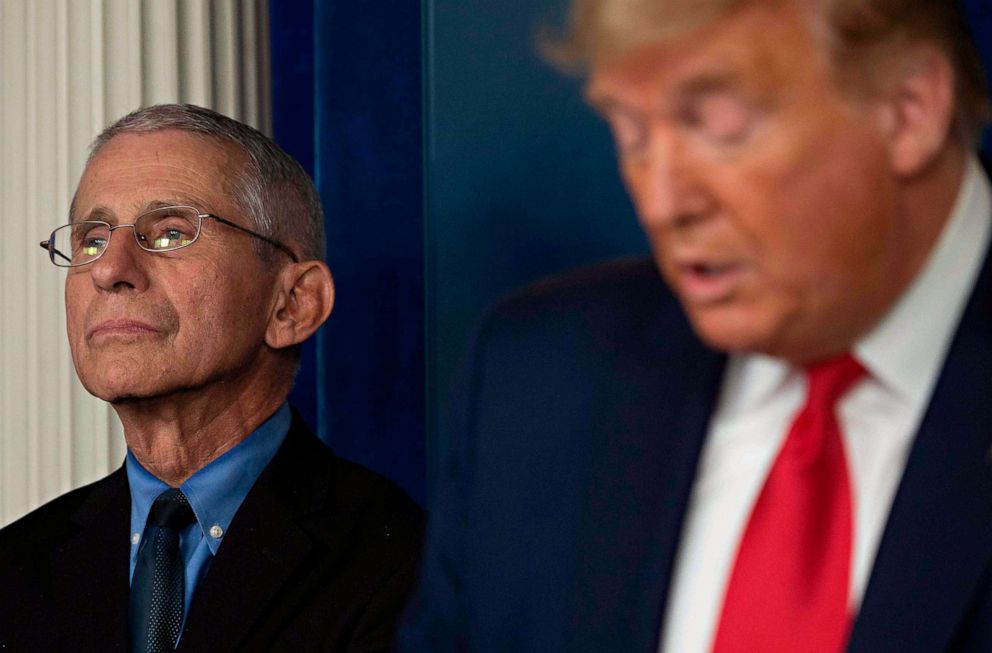
Jan. 29, 2020: White House coronavirus task force created
US cases: 5; US deaths: 0
Roughly one week after the first American is confirmed to have the coronavirus -- someone who had recently visited China and returned to Washington state, the White House starts its coronavirus response task force. Fauci, director of the National Institute for Allergy and Infectious Diseases, is immediately appointed.
Feb. 2, 2020: Trump partially blocks travel from China
US cases: 8; US deaths: 0
Trump's executive order blocking entry to the U.S. from anyone who has been in China in the last 14 days takes effect. It does not apply to U.S. residents and family members or spouses of U.S. residents or citizens. Trump would later claim Fauci was opposed, counting it among his "mistakes." Fauci responded its effectiveness was limited since the virus was already in the U.S.
Feb. 26, 2020: Trump says US cases will be 'close to zero'
US cases: 59; US deaths: 0
"We're going to be pretty soon at only five people," Trump says at a public task force briefing. "And we could be at just one or two people over the next short period of time." He adds, "when you have 15 people, and the 15 within a couple of days is going to be down to close to zero, that's a pretty good job we've done."
Feb. 29, 2020: Fauci says current risk to Americans is low but could change, Trump compares COVID-19 to flu
US cases: 69; US deaths: 1
"There's no need to change anything that you're doing on a day by day basis," Fauci says on NBC's "Today" program, another of the "mistakes" Trump and the White House would later point to in its effort to undermine him. But the White House list of Fauci quotes does not include the rest of what he said: "Right now the risk is still low, but this could change. When you start to see community spread, this could change and force you to become much more attentive to doing things that would protect you from spread."
March 11, 2020: Trump bans travel from Europe, Fauci shows support citing virus
US cases: 1,039; US deaths: 32
Trump announces a ban on travel from Europe during a national address from the Oval Office. The ban does not apply to U.S. citizens and excludes the U.K. and Ireland.
The next day Fauci tells House lawmakers that he supports Trump's travel bans calling the case for them "pretty compelling." He also calls the U.S. testing system "a failing."
"The idea of anybody getting it easily the way people in other countries are doing it, we're not set up for that. Do I think we should be? Yes. But we're not," he tells the House Oversight Committee, after Trump said at the Centers for Disease Control and Prevention, "Anybody that wants a test can get a test."
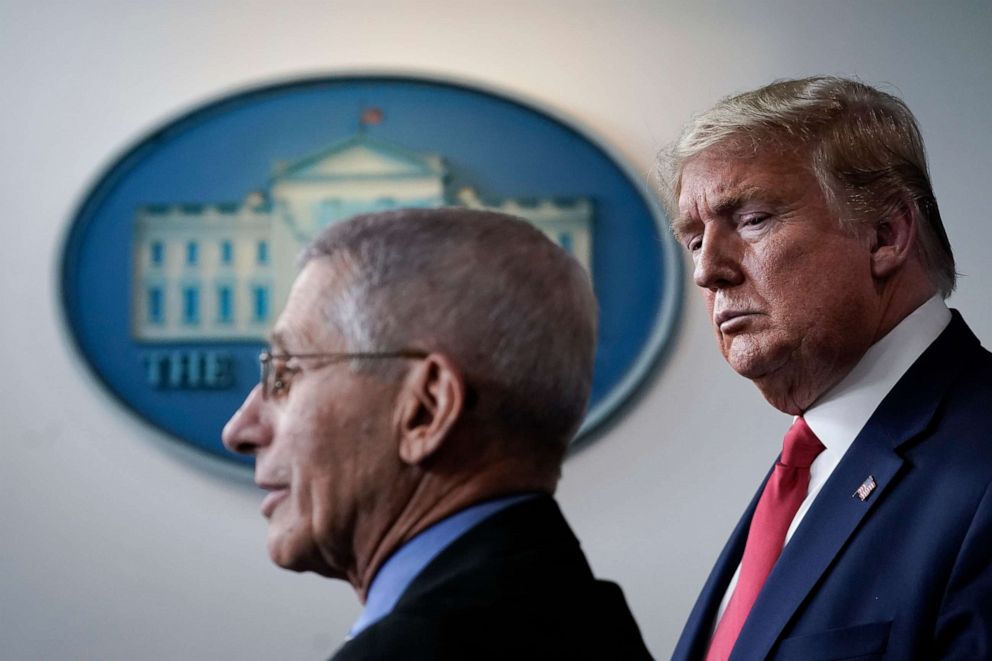
March 17, 2020: Trump compliments Fauci's popularity
US cases: 5,894; US deaths: 96
In a task force briefing, Trump pays Fauci a back-handed compliment, calling him a "major television star for all the right reasons."
March 20, 2020: Fauci downplays Trump's declaration that 'approved' malaria drug is a 'game changer'
US cases: 19,285; US deaths: 242
A day after Trump declared hydroxychloroquine an anti-malaria drug a "game-changer" in the fight against coronavirus, Fauci says signs of the drug's promise was purely "anecdotal evidence."
Trump then stepped forward to add: "We'll see. We're going to know soon."
March 22, 2020: Fauci says he can't 'jump in front' of Trump
US cases: 33,276 ; US deaths: 417
Fauci tells Science magazine in an interview that he "can't jump in front of the microphone and push him down. OK, he said it. Let's try and get it corrected for the next time."
When asked how he is avoiding being fired, Fauci says that even though he disagrees with Trump, "on some things, he listens. He goes his own way."
March 24, 2020: Trump says he wants the country open by April 12, Fauci cautions to 'be flexible'
US cases: 51,542; US deaths: 674
Trump says on Fox News he would "love to have the country opened up, and just raring to go by Easter."
"The president clearly listens. I mean, he has this aspirational goal of hoping that we might be able to do it by a certain date. We talked with him about that. We say we need to be flexible. He realizes that and he accepts that," Fauci tells Fox News.
April 3, 2020: CDC issues cloth face covering recommendation
US cases: 270,473; US deaths: 6,889
Trump announces that his administration is recommending people wear cloth face coverings to help contain the spread of the coronavirus. Trump at a task force briefing says the measure is voluntary, and he does not see himself partaking.
"I just don't want to wear one myself. It's a recommendation. I am feeling good," Trump said at task force briefing. "I just don't want to be doing -- I don't know, somehow sitting in the Oval Office behind that beautiful Resolute Desk, the great Resolute Desk, I think wearing a face mask as I greet presidents, prime ministers, dictators, kings, queens. I don't know, somehow, I don't see it for myself."
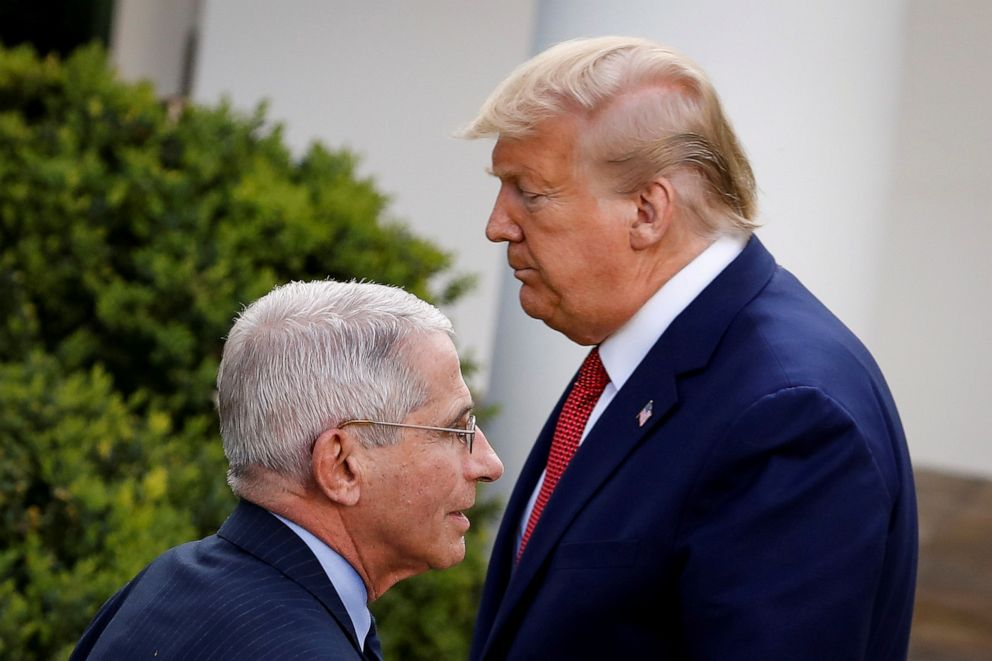
April 5, 2020: Trump continues to push hydroxychloroquine, Fauci says data is 'at best suggestive'
US cases: 331,151; US deaths: 9,441
After Trump says in successive briefings that U.S. citizens should try an unproven anti-malaria drug, hydroxychloroquine, to treat COVID-19, Fauci tells CBS, "In terms of science, I don't think we can definitively say it works."
"Take it. What do you have to lose?" Trump said, before eventually telling reporters in May he took a dosage of the drug himself.
"The data are really just at best suggestive," Fauci says.
April 12, 2020: Fauci says 'no one is going to deny' that earlier mitigation efforts would have saved lives
US cases: 547,681; US deaths: 21,692
"Obviously, you could logically say that if you had a process that was ongoing and started mitigation earlier, you could have saved lives. Obviously no one is going to deny that," Fauci says on CNN. "If we had, right from the very beginning shut everything down, it may have been different. But there was a lot of push back for shutting everything down back then."
April 13, 2020: Trump retweets #FireFauci
US cases: 572,587; US deaths: 23,078
After Fauci says prevention efforts would have saved more lives, rumors stir that Trump will fire Fauci. Trump retweets a tweet with the hashtag #FireFauci, adding the comment: "I banned China long before people spoke up."
Fauci clarifies in a task force briefing his comment was a "poor choice of words."
April 23, 2020: Trump suggests injecting disinfectants could help treat the virus, Fauci says testing is lagging
US cases: 856,209; US deaths: 49,861
At a task force briefing, Trump discusses injecting disinfectants into the body.
"And then I see the disinfectant, where it knocks it out in a minute. One minute. And is there a way we can do something like that, by injection inside or almost a cleaning. Because you see it gets in the lungs and it does a tremendous number on the lungs. So it would be interesting to check that. So, that, you're going to have to use medical doctors with. But it sounds -- it sounds interesting to me."
In an interview with Time, Fauci says the U.S. isn't ready with the level of testing needed to reopen the country as Trump wants.
"I am not overly confident right now at all that we have what it takes to do that. We are doing better, and I think we are going to get there, but we are not there yet," Fauci tells Time.
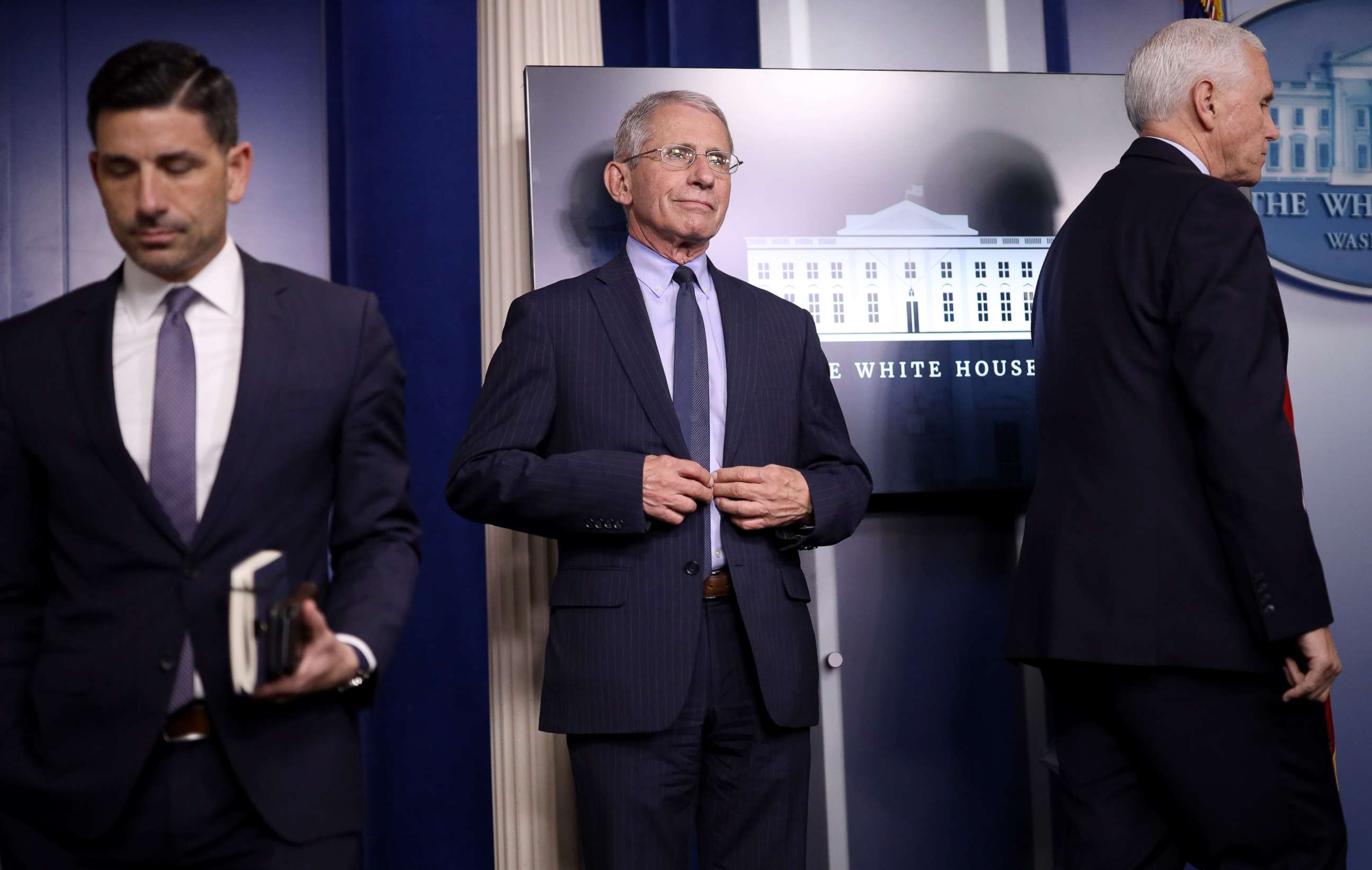
April 24, 2020: Trump says 'I don't agree' with Fauci
US cases: 889,661; US deaths: 50,890
The president openly disagrees with Fauci, who was not present at the day's task force briefing. Neither was White House coronavirus response coordinator Dr. Deborah Birx.
"I don't agree with him on that. No. I think we're doing a great job on testing. I don't agree -- if he said that, I don't agree with him," Trump says.
May 5, 2020: White House moves to dismantle task force
US cases: 1,199,238; US deaths: 70,646
The White House announces plans to dismantle the task force around Memorial Day.
The move to end the briefings -- and with that Americans being able to hear from Fauci regularly from the symbolic and authoritative setting of the White House -- comes as roughly 30 states ease social distancing restrictions.
May 6, 2020: Trump says he had 'no idea' that 'respected' task force was so popular
US cases: 1,223,419; US deaths: 72,812
In an Oval Office event, Trump explains why he reversed himself in saying the task force will continue for now but "at a certain point, we won't need the task force."
"I had no idea how popular the task force is until actually yesterday when I started talking about winding it down I got calls from very respected people saying, 'I think it'd be better to keep it going. It's done such a good job. It's a respected task force,'" Trump says. "I knew it myself, but I didn't know whether or not it was appreciated by the public but it is appreciated by the public."
Trump says "by adding two or three additional members" to the task force on Monday who he suggested will bring expertise on "opening our country."
May 12, 2020: Fauci testifies again on avoidable 'suffering and death'
US cases: 1,359,319; US deaths: 81,847
In his first congressional testimony since Trump declared the coronavirus a national emergency on March 13, Fauci bluntly lays out the dangers of ignoring federal reopening guidelines.
Fauci says Americans would experience "suffering and death that could be avoided," if states ignore federal guidelines. "My concern is that we will start to see little spikes that might turn into outbreaks."
Fauci also tells the Senate committee it was a "bridge too far" for schools to expect a vaccine or widely available treatment for COVID-19 by the time students return to universities in the fall.
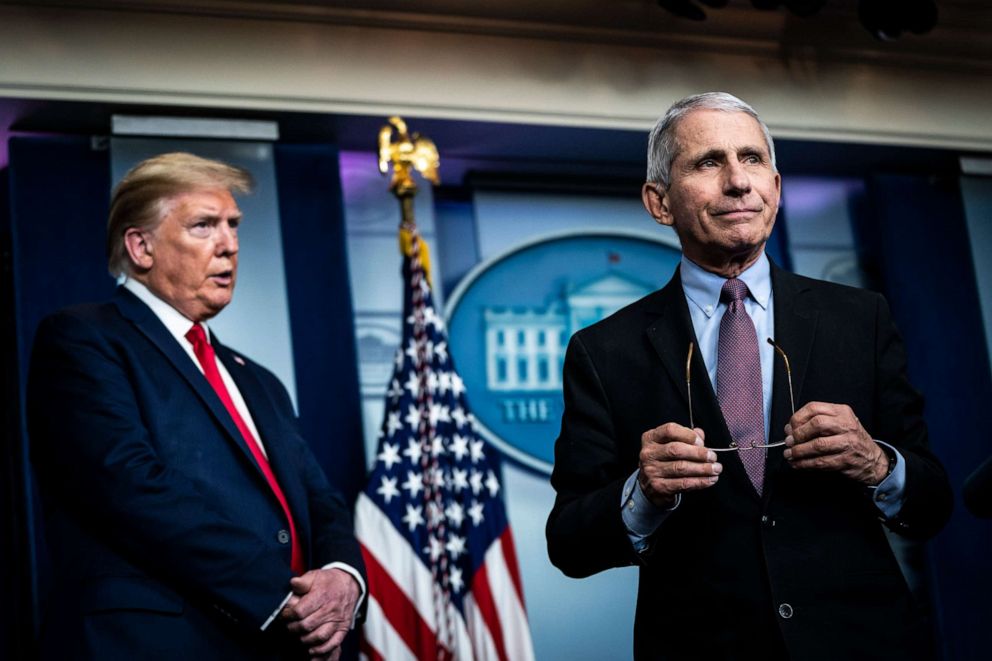
May 13, 2020: Trump calls Fauci's response on schools 'an unacceptable answer'
US cases: 1,385,639; US deaths: 83,648
Asked about Fauci's concerns with reopening schools in the fall where there are localized outbreaks that might get out of control, Trump says Fauci "wants to play all sides of the equation."
Pressed to clarify what he meant by all sides, Trump says he was speaking on schools specifically and didn't think Fauci's response to the topic on Tuesday was "an acceptable answer."
"I was surprised by his answer, actually, because, you know, it's just, to me, it's not an acceptable answer, especially when it comes to schools," Trump says.
June 1, 2020: Fauci says meetings with Trump have 'dramatically decreased'
US cases: 1,799,747; US deaths: 104,702
In an interview with Stat, Fauci says the task force is no longer holding daily meetings.
"But as you probably noticed, that the task force meetings have not occurred as often lately," he told Stat. "And certainly my meetings with the president have been dramatically decreased."
June 23, 2020: Fauci warns of 'disturbing surge' as Trump says virus is 'going away'
US cases: 2,329,637; US deaths: 121,029
Fauci warns lawmakers of the need to continue or increase strong precautionary measures to contain what he called a "disturbing surge."
Trump speaks at a mega-church in the hot-spot state of Arizona packed with supporters not wearing masks.
"It is going away," Trump says, calling coronavirus "the plague" and repeating that the surge in U.S. cases could be chalked up to an increase in testing.
June 30, 2020: Fauci says US could reach 100,000 new cases a day
US cases: 2,620,224; US deaths: 126,628
Fauci issues a stark warning to lawmakers, telling them he wouldn't be surprised if the U.S. sees new cases of coronavirus rising to a level of 100,000 a day.
"We are now having 40-plus thousand new cases a day. I would not be surprised if we go up to 100,000 a day if this does not turn around and so I am very concerned," Fauci tells the Senate Health, Education, Labor and Pensions Committee during a hearing on the pandemic.
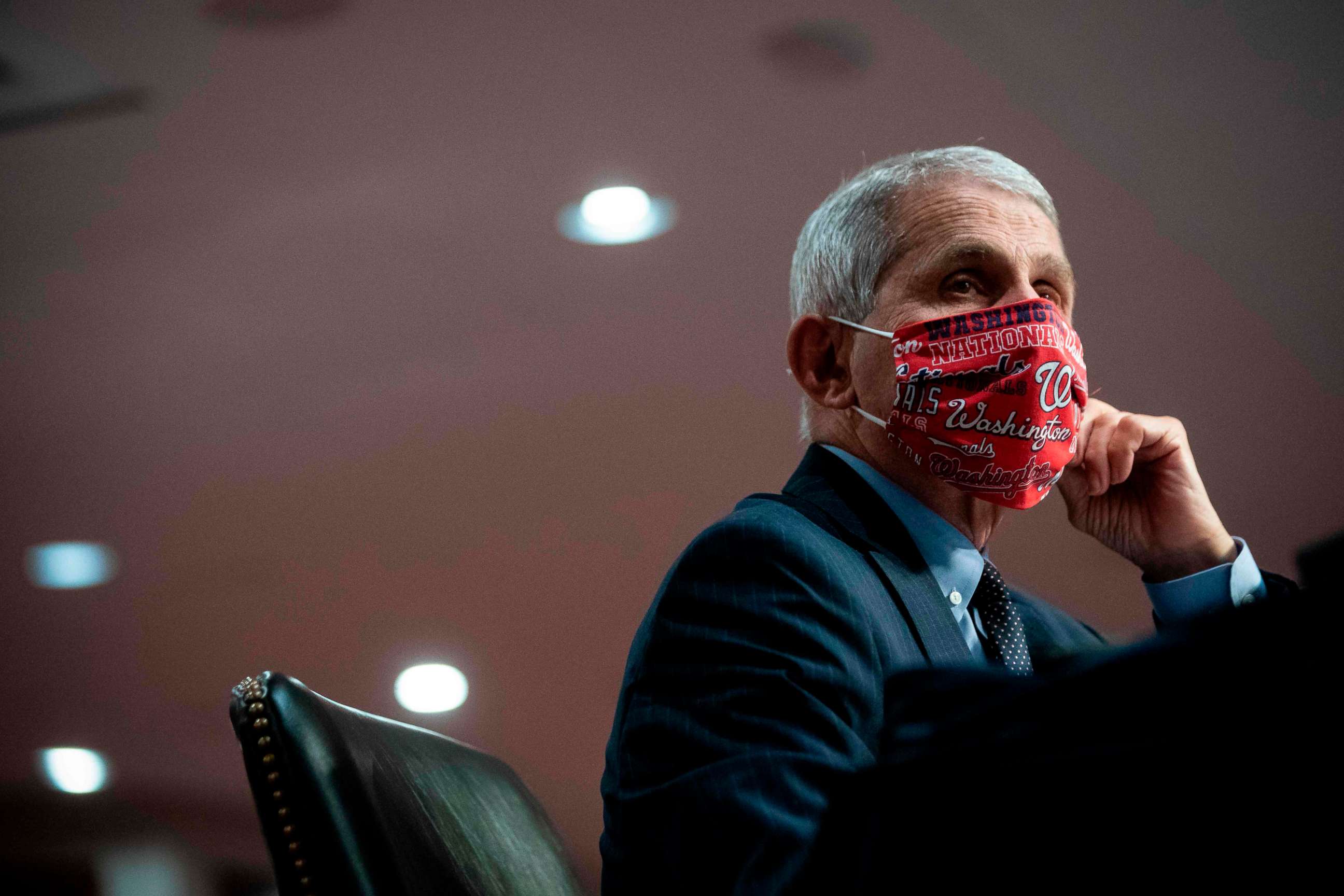
July 7, 2020: Trump says he disagrees with Fauci's outlook on the virus
US cases: 2,980,906; US deaths: 131,238
"Well, I think we are in a good place," Trump tells "Full Court Press" with Greta Van Susteren in response. "I disagree with him."
July 8, 2020: White House doesn't say directly whether Trump has confidence in Fauci
US cases: 3,035,231; US deaths: 131,960
At an afternoon White House briefing, press secretary Kayleigh McEnany doesn't directly answer when asked whether Trump still has confidence in Fauci.
"The president has confidence -- confidence in the conclusions of our medical experts, but it's up to him to determine what to do with that information and to take what we hear from Dr. Fauci, Dr. Birx and others and take what he values in their opinion and come to the ultimate consensus that's best for this country," she says.
Fauci is notably absent from the day's task force briefing, and therefore unable to answer questions from reporters on schools reopening.
July 9, 2020: Trump says Fauci has 'made a lot of mistakes,' Fauci says US is 'just not' doing great
US cases: 3,088,913; US deaths: 132,934
"Dr. Fauci is a nice man, but he's made a lot of mistakes," Trump tells Fox News' Sean Hannity, repeating Fauci was against his travel ban on China and wrong on face masks.
Fauci tells FiveThirtyEight's Anna Rothschild the country's hyper-partisan environment has made it more difficult to suppress the virus: "I think you'd have to admit that that's the case."
"You have to be having blindfolders on and covering your ears to think that we don't live in a very divisive society now, from a political standpoint," Fauci says. "You'd have to make the assumption that if there wasn't such divisiveness, that we would have a more coordinated approach."
"As a country, when you compare us to other countries, I don't think you can say we're doing great. I mean, we're just not," he says.
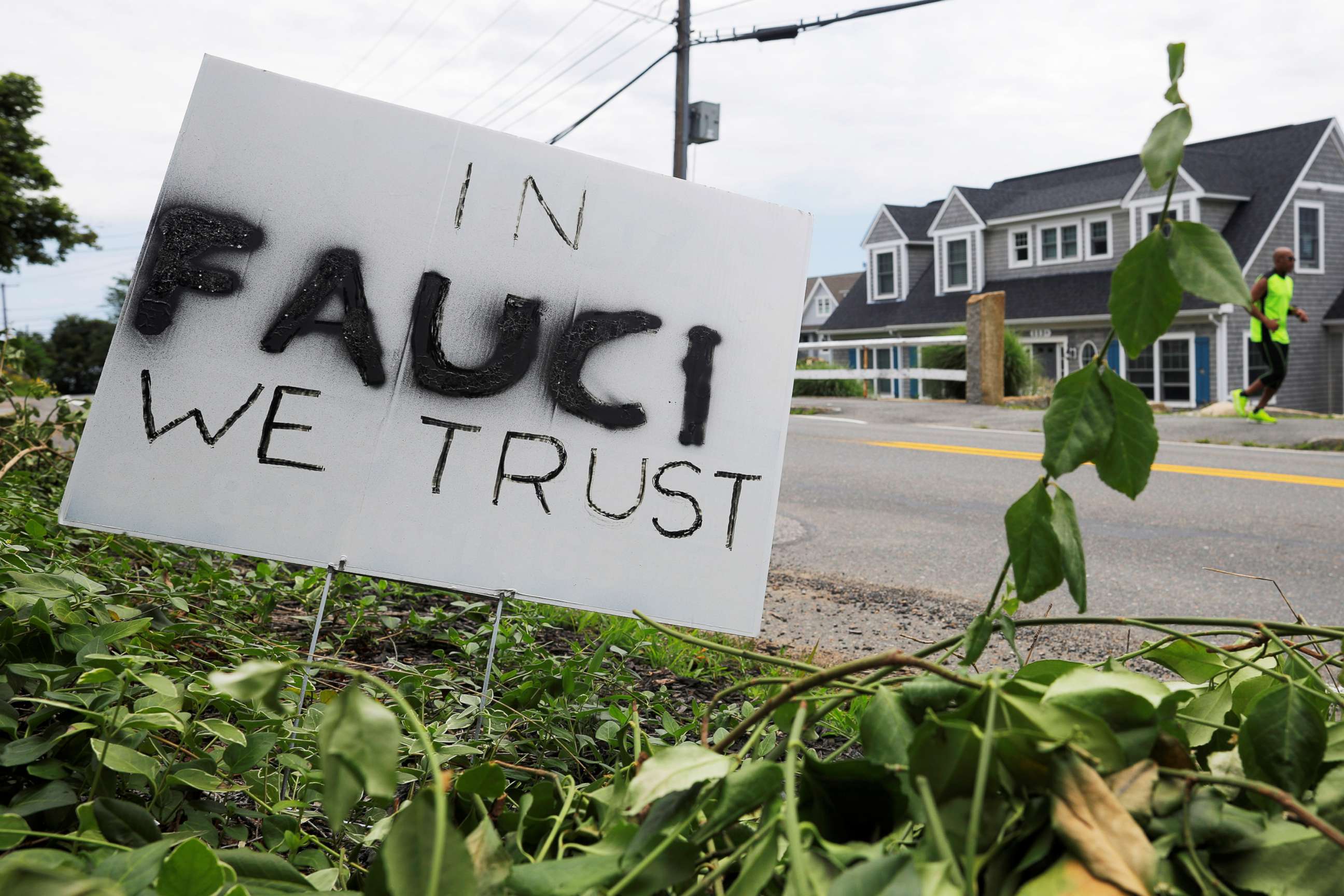
July 10, 2020: Fauci says he hasn't briefed Trump in two months
US cases: 3,158,183; US deaths: 133,777
In an interview with the Financial Times, Fauci reveals the last time he saw the president in person at the White House was on June 2 and that he has not briefed him for at least two months.
"I have a reputation, as you probably have figured out, of speaking the truth at all times and not sugar-coating things," Fauci says. "And that may be one of the reasons why I haven't been on television very much lately."
July 13, 2020: Fauci visits White House to meet with Meadows, not Trump
US cases: 3,346,246;US deaths: 135,477
Trump shares a message on Twitter Monday, saying doctors and the Centers for Disease Control and Prevention are "lying." Then, after retweeting a message critical of Fauci, Trump later in the day pointedly says he likes Fauci "personally" and that they "don't always agree."
Fauci, meanwhile, says, "This is a really serious problem. It is truly historic. We haven't even begun to see the end of it yet."
He meets with White House Chief of Staff Mark Meadows in the Oval Office.
July 14, 2020: Fauci: 'I think you can trust me,' advises students not to get involved in 'political nonsense'
US cases: 3,406,945;US deaths: 136,244
Asked during a Georgetown University Global Health Initiative webinar whom the public should trust on coronavirus as cases surge, Fauci says, "I believe, for the most part, you can trust respected medical authorities. You know I believe I'm one of them. So I think you can trust me. But I would stick with respected medical authorities."
Later questioned on how to keep politics out of science, Fauci says, "It doesn’t matter who you are” and whether you are “Republican or Democrat or anybody else. We are all in this together."
“Do your thing, and don’t get involved in any way in any of the political nonsense. That’s a waste of time, and a distraction,” he added.
ABC News' Rachel Katz contributed to this reporting.
